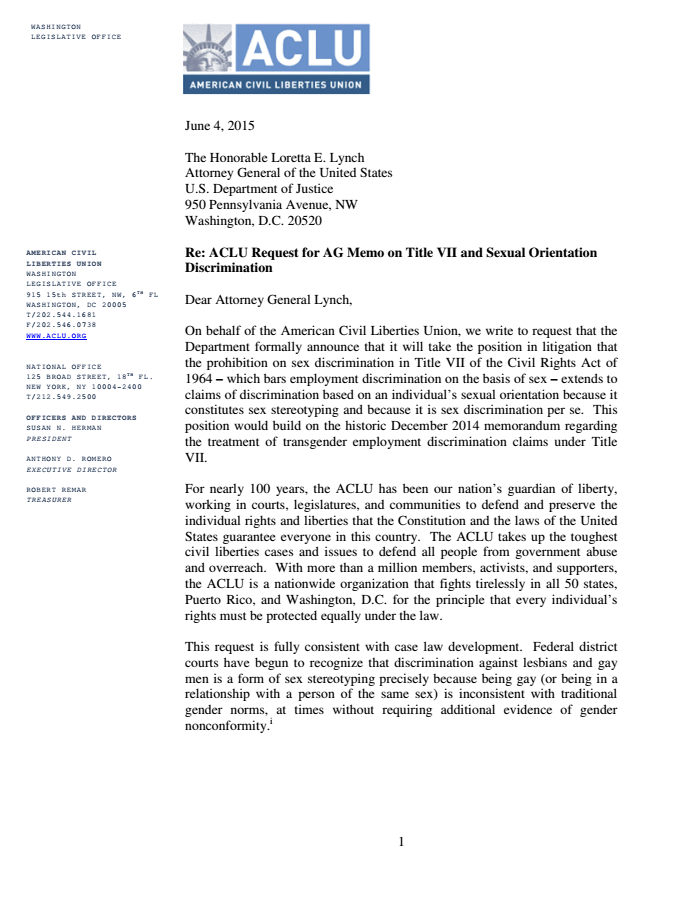
WASHINGTON — The American Civil Liberties Union is asking the Justice Department to take the position that anti-gay discrimination violates the sex discrimination ban in Title VII of the Civil Rights Act of 1964.
In a letter sent Thursday to Attorney General Loretta Lynch, the ACLU asked the Justice Department to take that position — that Title VII's sex discrimination ban includes anti-gay and all sexual orientation-based discrimination — in litigation going forward.
In recent years, legislative efforts to pass sexual-orientation and gender identity-specific nondiscrimination laws through Congress have stalled. In November 2013, the Senate passed the Employment Non-Discrimination Act, longstanding legislation to ban employment discrimination against LGBT people, but the House never took up the measure.
The ACLU's request on Thursday follows a similar move taken by the Justice Department in December 2014, when then-Attorney General Eric Holder announced that the department would begin supporting transgender discrimination claims in litigation as violating Title VII. Since then, the Justice Department has weighed in to support a private lawsuit against Saks and filed a case against Oklahoma's university system, both based on allegations that anti-trans discrimination violated Title VII.
Two years before the Justice Department's decision to support trans discrimination claims, the Equal Employment Opportunity Commission held that Title VII banned anti-trans and other gender identity-based discrimination for federal employees' challenges and in the EEOC's own practices, including its role investigating and addressing private employment discrimination claims.
The inclusion of sexual orientation-based discrimination under Title VII has lagged because, as the ACLU's Joshua Block previously told BuzzFeed News, many of the earlier cases on the issue were considered while old laws like the Supreme Court's 1986 decision that upheld sodomy laws against gay people were still on the books.
In the time since the Supreme Court reversed that decision and struck down sodomy laws in 2003, federal courts and the EEOC have held that sexual orientation discrimination — to the extent that it is based in sex-stereotyping — can violate Title VII. No federal appeals courts or the Supreme Court, however, have held that all sexual orientation discrimination is per se — or, automatically — sex discrimination.
Lower federal courts and the EEOC have begun expanding their views on the issue in recent years, leading to a February EEOC field memo previously obtained by BuzzFeed News detailing its current view on the issue. In the memo, the independent agency stated its position that "intentional discrimination based on an individual's sexual orientation can be proved to be grounded in sex-based norms [because they] can include the expectation that men should be sexually attracted to women and that women should be sexually attracted to men."
While not, technically, a statement that all sexual-orientation discrimination is sex discrimination, the EEOC view leaves few areas that would not be covered.
Now, though, the ACLU is asking the Justice Department to take the lead and announce definitively that it believes Title VII's sex discrimination ban "extends to claims of discrimination based on an individual's sexual orientation because it constitutes sex stereotyping and because it is sex discrimination per se."
In the letter to Lynch, the group tells her this would be "would be one of the most significant actions you could take during your tenure as Attorney General to advance the equal treatment of LGBT Americans."

